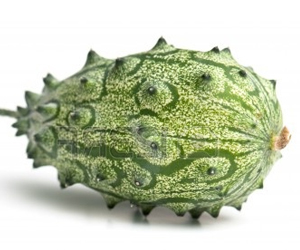
Horned Melon or Cucumis Metuliferus is orange colored fruit naturally found in Africa which is now cultivated in Newzealand, Australia, Kenya, Newzealad, France and Israel. Other common names include jelly melon, métulon (France), and the trademarked names Kiwano (New Zealand), Horn Gurke (German) and Melano (Israel)
Facts about Horned Melon (Kiwano Melon)
| Name | Horned Melon |
|---|---|
| Scientific Name | Cucumis Metuliferus |
| Common/English Name | African cucumber, African horned cucumber, African horned melon, Bitter wild cucumber, Blowfish fruit, English tomato, Hedged gourd, Horned cucumber, Horned gourd, Horned melon, Horny ucumber, Jelly melon, Kiwano, Melano, Metulon, Spiked pears, Spiny cucumber |
| Name in Other Languages | Metulon (French), Rooi-agurkie, Rooikomkommer (Afr.), Mokapana (Tswana) more>> |
| History and origin | Kiwano grows naturally in the tropical and subtropical sub-Saharan regions of Africa, stretching from Senegal to Somalia and South Africa. It has also been found in Yemen. Now It is primarily cultivated in California, Mississippi, Chile, Australia, and New Zealand, where it was introduced in the 1930s. |
| Fruit shape & size | Similar size in shape to a medium papaya or large pear, slightly oval in shape. It has horn-like spines, hence the name became “horned melon”
Normal size is about 8-10 cm long and 4-5 cm in diameter |
| Fruit weight | About 209g |
| Fruit color |
|
| Flesh color | Juicy, green and translucent and contains a lot of seeds covered in a gelatin-like substance. |
| Fruit peel | Fruit peel |
| Flavor/aroma | Tart flavor |
| Fruit Taste | sweet and tart Its taste has been compared to a combination of cucumber and zucchini or a combination of banana, cucumber and lemon |
| Season | Available during the summer season |
| Major Nutritions | Vitamin C (13.67%), Vitamin B6 (11.31%), Zinc (10.18%), Vitamin B5 (8.52%), Vitamin B3 (8.23%), Potassium (6.11%), Copper (5.22%), Thaimin (4.83%) |
| Calories in 1cup (233 gm) | 103 Kcal |
| It is said that |
|
| Precautions |
|
| How to Eat |
|
Reference:
https://hort.purdue.edu/newcrop/CropFactSheets/kiwano.html
http://www.plantzafrica.com/plantcd/cucumismet.htm
http://link.springer.com/chapter/10.1007/978-94-007-1764-0_37#page-3
http://stipulae.johnvanhulst.com/DOCS/PDF/HORNED%20MELON%20PROTA.pdf
Awesome
Comments
comments